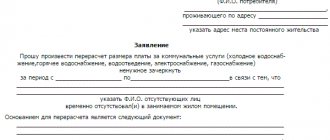Since 2021, the provisions of the Rules for the provision of utility services as amended by Decree of the Government of the Russian Federation dated December 26, 2017 No. 1498 regarding the recalculation of fees for utility services due to the temporary absence of a consumer in a residential premises have changed. Now recalculation is carried out only in the case when the absence of an IPU in the premises is due to the lack of technical ability to install a meter. Let's look at the new provisions in more detail, and also study the situation that arose in practice for our reader: the consumer demands a recalculation of fees for the period before the amendments come into force.
New provisions encourage the installation of IPU
Along with numerous amendments to the Rules for the provision of public utility services, which enable the contractor to punish unscrupulous consumers with rubles, the principle of recalculating fees in the event of a consumer’s temporary absence from the premises was fundamentally changed. By the way, the recalculation procedure remained virtually unchanged.
So, if previously the recalculation was carried out for all consumers temporarily absent in the premises not equipped with an IPU, now the recalculation is carried out for consumers who were absent in the premises not equipped with an IPU due to the lack of technical ability to install it, confirmed in the prescribed manner (clause 86 Rules for the provision of public services). That is why the consumer’s application for recalculation should be accompanied not only by documents confirming the duration of the period of temporary absence, but also by an inspection report to determine the lack of technical feasibility of installing an IPU (clause 92 of the above rules).
In the absence of an IPU and the lack of confirmation of the lack of technical ability to install it, as well as in the event of a malfunction of the IPU in a residential premises (if the consumer fails to eliminate such a malfunction within 30 days), recalculation is not made. An exception is the case of the absence of all persons living in the residential premises as a result of force majeure, confirmed by relevant documents (for example, the eviction of citizens from their home due to an emergency).
The above provisions of the rules actually encourage owners of premises in apartment buildings to install IPU, if the appropriate technical capability is available. Otherwise, when calculating the fee, an increasing factor will be applied, and you can count on a reduction in the amount of payment only if the number of consumers changes (deregistration at the place of residence or temporary stay).
New procedure for recalculation for temporary absence from the apartment
2017-03-15 From January 1, 2021, amendments to the Decree of the Government of the Russian Federation No. 354 (hereinafter referred to as the Rules) dated May 6, 2011 came into force regarding recalculations for temporary absence from residential premises. 2021, the Management Company was obliged to recalculate all consumers if
- their living quarters were not equipped with individual or shared (apartment) metering devices;
- residents documented the fact of their absence (such documents could be certificates from a gardening non-profit partnership, travel tickets, travel certificates and a number of others).
The new edition of clause 86 of the Rules allows recalculation in the temporary absence of a consumer only if the residential premises are not equipped with a meter due to the lack of technical ability to install it, which is confirmed in the manner prescribed by these Rules. This procedure involves drawing up an inspection report to determine the technical feasibility of installing metering devices, the form of which is approved by the Ministry of Construction and Housing and Communal Services of the Russian Federation. If such an act is available, the fee for the service provided is recalculated in favor of the resident, with the exception of utilities for heating, electricity and gas supply for the purpose of heating residential (non-residential) premises. At the same time, residents, as before, must document the fact of their absence.
Recalculation is not made if the residential premises are not equipped with a metering device and the lack of technical ability to install it is not confirmed in the manner prescribed by these Rules. Also, you won’t be able to save money on utilities if the meter is faulty, the meter’s calibration interval has expired, and the resident has not fulfilled his responsibilities for repairing or calibrating it. Exceptions are considered cases of absence of all residents in the residential premises as a result of force majeure, with documentary confirmation of this fact.
An important innovation was the determination of the procedure for paying for housing and communal services in an apartment where no one is registered or lives. Since this year, Section VI of the Rules has been supplemented with clause 56 (2), according to which, in the absence of citizens permanently or temporarily residing in a residential premises, the volume of utilities is calculated taking into account the number of owners of such premises. In other words, even if no one is registered or living in the apartment, utility bills will still be charged . If there is only one owner, there is only one for him. If the apartment is in shared ownership and has several owners, then utility bills will be distributed among them.
We also remind you that in the absence of a metering device for cold, hot water and electrical energy and in the case of an obligation to install such a metering device, the amount of payment for utility services is determined based on the consumption standard using an increasing factor, which from January 1, 2021 is 1.5.
Back
Action of a new order in time.
Until 01/01/2017, the rule was in effect that temporary absence from the premises is grounds for recalculation of the fee in itself, regardless of the reason for not installing the IPU on the premises. After the new rule comes into force, the question arises: how to apply it over time? Is the contractor obliged to recalculate the fee for 2021 if the application is submitted in 2021? Should the fee be reduced if the period of temporary absence from the premises began in 2021 and ended in 2021 (if it is technically possible to install an IPU)?
The answers to all these questions can be found in Art. 6 Housing Code of the Russian Federation. The rules for the provision of utility services, approved by a resolution of the Government of the Russian Federation, are an act of housing legislation (Part 2 of Article 5 of the Housing Code of the Russian Federation). In accordance with Part 1 of Art. 6 of the Housing Code of the Russian Federation, acts of housing legislation do not have retroactive force and apply to housing relations that arose after their entry into force. In housing relations that arose before the enactment of the housing legislation act, this act applies to housing rights and obligations that arose after its entry into force (Part 3 of Article 6 of the Housing Code of the Russian Federation). In paragraph 5 of the Resolution of the Plenum of the Armed Forces of the Russian Federation dated July 2, 2009 No. 14, it is explained: since relations regulated by housing legislation, as a rule, are of an ongoing nature, the rights and obligations of the subjects of these relations may arise even after the legal relationship itself has arisen. Indeed, the legal relationship between the consumer and the contractor arose at the moment the provision of utility services began. Since it is ongoing, the provisions of the new edition of the Rules for the provision of utility services apply only to rights and obligations that arose after 01/01/2017.
In other words, the consumer has the right to claim a recalculation of utility bills for the period of temporary absence from a residential premises not equipped with an IPU (including even if it is technically possible to install it), until 12/31/2016 inclusive. Recalculation for the period of temporary absence from 01/01/2017 is possible only if the lack of technical ability to install the IPU is confirmed.
Thus, the cancellation of recalculation of fees for utility services if it is technically possible to install an IPU is not a reason for refusal to recalculate fees for the period before 12/31/2016, including when submitting the corresponding application after 01/01/2017.
Preservation of rights to residential premises in the temporary absence of the tenant and (or) members of his family
According to Art. 71 of the Housing Code of the Russian Federation, the rights and obligations of a temporarily absent employer and members of his family do not change. (Although local self-government regulations may establish a recalculation procedure)
The rights of temporarily absent persons must be respected when performing all legally significant actions, this is evidenced not only by Article 71 of the RF Housing Code; the legislator specifically stipulates these provisions in the rules governing certain rights and obligations of the employer and members of his family.
The Housing Committee refused to establish any period of temporary absence or clarify its reasons.
History of the development of the institute: Previously existing Housing Complex of the RSFSR 1983. contained Art. 60, which provided for the possibility of maintaining one’s rights in case of temporary absence only for 6 months. In Part 2 of Art. 60 listed cases when the employer and members of his family retained their rights for longer periods, for example, when going to work abroad, to the Far North, while staying in medical institutions, the right to use was retained for the entire duration of work or stay in such institutions, but for those sentenced to imprisonment in paragraph 8, a 6-month period was established, regardless of the term of conviction, therefore the initiative to appeal to the Constitutional Court of the Russian Federation to recognize these norms as inconsistent with the Constitution of the Russian Federation came precisely from the convicted. As a result, Resolution of the Constitutional Court of the Russian Federation dated June 23, 1995 No. 8-P, Part 1 and Clause 8, Part 2, Art. 60 of the RSFSR Housing Code were found inconsistent with the Constitution of the Russian Federation and from that moment the entire article as a whole ceased to be applied. However, it should be remembered that the Resolution of the Constitutional Court of the Russian Federation extended its effect to those relations that arose after its adoption
It has become impossible to recognize a person as having lost the right to housing under a social tenancy agreement in the event of his temporary absence, even without good reason. The only reason is to move to another permanent place of residence.
This approach of the legislator has both its advantages and disadvantages; on the one hand, the norm ensures the stability of rights of use, on the other hand, it paralyzes the administrative actions of residents living in residential premises. Whether the absent person has lost family ties with the residents, whether he has formed a new family, whether he is provided with another living quarters, the norms of this article do not allow changing his rights and obligations and the fact that all administrative powers (exchange, move-in, replacement) are subject to agreement with him. this may negatively affect the lifestyle of the remaining residents and the ability to make the decisions they need.
According to paragraph 32 of the Resolution of the Plenum of the Armed Forces of the Russian Federation No. 14: In the temporary absence of the tenant of the residential premises and (or) members of his family, including former family members, they retain all rights and obligations under the social tenancy agreement for residential premises (Article 71 of the Housing Code of the Russian Federation) . If the absence of these persons from the residential premises is not temporary, then interested parties (landlord, tenant, members of the tenant’s family) have the right to demand in court that they have lost the right to residential premises on the basis of Part 3 of Article 83 of the Housing Code of the Russian Federation in connection with leaving for another place of residence and thereby terminating the social tenancy agreement. When resolving disputes about recognizing a tenant, a family member of a tenant or a former family member of a tenant of a residential premises as having lost the right to use residential premises under a social tenancy agreement due to their constant absence from the residential premises due to leaving it, the courts must find out: for what reason and for how long the defendant is absent in the residential premises, whether his departure from the residential premises is forced (conflictual relationships in the family, divorce) or voluntary, temporary (work, training, treatment, etc.) or permanent (took out his things, moved to another locality , entered into a new marriage and lives with a new family in another residential premises, etc.), whether there were any obstacles to him in using the residential premises from other persons living in it, whether the defendant acquired the right to use another residential premises in a new location residence, whether he fulfills his obligations under the contract to pay for housing and utilities, etc.
If the court establishes circumstances indicating the voluntary departure of the defendant from the residential premises to another place of residence and the absence of obstacles in the use of the residential premises, as well as his unilateral refusal of rights and obligations under the social tenancy agreement, a claim to recognize him as having lost the right to residential premises are subject to satisfaction on the basis of Part 3 of Article 83 of the Housing Code of the Russian Federation in connection with the termination of the social tenancy agreement by the defendant in relation to himself.
The absence of a citizen who voluntarily left a residential premises for another place of residence, in the new place of residence, the right to use residential premises under a social tenancy agreement or the right of ownership of residential premises cannot in itself be a basis for recognizing the absence of this citizen in the disputed residential premises as temporary , since, according to Part 2 of Article 1 of the Housing Code of the Russian Federation, citizens, at their own discretion and in their own interests, exercise their housing rights. A citizen’s intention to refuse to use residential premises under a social tenancy agreement can be confirmed by various evidence, including certain actions, collectively indicating such an expression of will of the citizen as a party to the residential tenancy agreement.
About the 30-day preventive period.
According to clause 91 of the Rules for the provision of utility services, the recalculation of the amount of payment for utility services is carried out by the contractor within five working days after receiving a written application from the consumer to recalculate the amount of payment for utility services, submitted before the start of the period of temporary absence of the consumer or no later than 30 days after the end of the period of temporary absence of consumer. Paragraph 37 of the Resolution of the Plenum of the Armed Forces of the Russian Federation dated June 27, 2017 No. 22 states: the tenant, owner and other persons living in the residential premises, for valid reasons, have missed the deadline for filing an application for recalculation of utility bills due to his temporary absence (for example , serious illness or other circumstances beyond the control of a person due to which he was deprived of the opportunity to timely apply for a recalculation of fees for utility services) is not a basis for refusing to satisfy requests for a recalculation of such fees.
Please note that the 30-day period is preemptive, since it determines the period of existence of the consumer’s right to recalculate the fee. Not long ago, a citizen filed an application with the Constitutional Court of the Russian Federation to recognize clause 91 of the Rules for the provision of public utility services in terms of establishing a period of non-compliance with federal legislation on the statute of limitations. By ruling No. 587-O dated March 28, 2017, consideration of the complaint was refused, since the disputed provision was adopted within the competence of the Government of the Russian Federation and is aimed at ensuring the functioning of the communal infrastructure of residential buildings and thereby protecting the interests of citizens living in them and cannot be considered as violating constitutional rights and freedoms of the applicant listed in the complaint.
When receiving an application later than 30 days after the end of the period of temporary absence without indicating the reasons for violating this period, it is advisable for the contractor to request information about such reasons and independently assess their validity. The fact is that if the dispute goes to the stage of judicial proceedings, the consumer can declare these reasons and the court will take them into account based on the explanations of the Plenum of the Armed Forces of the Russian Federation.
Examples of court decisions in which missing a 30-day deadline became the only or one of several reasons for refusing to satisfy the consumer’s demands for recalculation are as follows: appeal rulings of the Samara Regional Court dated May 31, 2017 in case No. 33-6337/2017, Moscow City Court dated December 22, 2016 in case No. 33-51391/2016, dated November 24, 2014 in case No. 33-46838, Sverdlovsk Regional Court dated August 26, 2016 in case No. 33-14921/2016, Perm Regional Court dated June 6, 2016 in case No. 33‑6106/2016, Altai Regional Court dated 05/26/2015 in case No. 33‑4699/2015.
Judicial acts on consumer requests to recalculate contain the following remark: “The consumer’s arguments do not contain references to circumstances indicating that the deadline was missed for good reasons,” which is the reason for the refusal to carry out recalculation (Appeal ruling of the Volgograd Regional Court dated February 26, 2014 in case No. 33‑2261/2014).
NTVP "Kedr - Consultant"
LLC "NTVP "Kedr - Consultant" » Services » Legal consultations » Housing: purchase and sale, maintenance, payment » On the legality of the management organization’s refusal of a citizen’s request for recalculation of rent due to his long absence on a business trip
Question
The citizen went on a business trip, and after returning he contacted the management organization with a request to recalculate the rent. I received a refusal with reference to clause 94 of Government Decree No. 354, that the application for recalculation was submitted after 30 days. Is this legal?
Answer
In accordance with clause 91 of the Decree of the Government of the Russian Federation dated May 6, 2011 N 354 “On the provision of utility services to owners and users of premises in apartment buildings and residential buildings,” the recalculation of the amount of payment for utility services is carried out by the contractor within 5 working days after receiving a written application from the consumer about recalculation of the amount of payment for utility services (hereinafter referred to as the application for recalculation), submitted before the start of the period of temporary absence of the consumer or no later than 30 days after the end of the period of temporary absence of the consumer.
Decree of the Government of the Russian Federation dated 05/06/2011 N 354 (as amended on 09/04/2015) “On the provision of utility services to owners and users of premises in apartment buildings and residential buildings” (together with the “Rules for the provision of utility services to owners and users of premises in apartment buildings and residential buildings houses") {ConsultantPlus}
The parties to legal relations interpret legal norms differently. On the one hand, consumers are not obliged to pay for services that they did not actually consume (position 1). On the other hand, missing the deadline for submitting an application means a violation of the recalculation procedure; therefore, the contractor is not obliged to reduce the amount of payment for utility services (position 2). The second position seems more reasonable, especially since the courts evaluate the factual circumstances that led to missing the deadline for filing an application.
Position 1. According to paragraph 1 of Art. 781 of the Civil Code of the Russian Federation, the customer is obliged to pay for the services provided to him within the time frame and in the manner specified in the contract for the provision of paid services. Funds received by the contractor without grounds established by law or the transaction must be returned to the consumer (Article 1102 of the Civil Code of the Russian Federation). The general limitation period is three years (Article 196 of the Civil Code of the Russian Federation). Therefore, the contractor is obliged to recalculate services for the last three years at the request of the consumer.
Arbitrage practice. Absent.
Position 2 . According to paragraph 11 of Art. 155 of the Housing Code of the Russian Federation, non-use of premises by owners, tenants and other persons is not grounds for non-payment of payment for residential premises and utilities. In the temporary absence of citizens, payment for certain types of utility services, calculated on the basis of consumption standards, is carried out taking into account the recalculation of payments for the period of temporary absence of citizens in the manner approved by the Government of the Russian Federation. The corresponding procedure is set out in Section. VIII of the new Rules for the provision of public services. These norms indicate that legally and reasonably accrued utility bills made by the consumer, including those based on citizens temporarily absent from the premises, do not constitute unjust enrichment.
One of the conditions for the recalculation is the submission of an application by the consumer before the start of the period of his temporary absence from the premises or no later than 30 days after the end of this period (clause 91). In the absence of an application for recalculation, the contractor is not obliged to reduce the consumer's payment. Violation of this deadline should be considered a violation that deprives the consumer of the right to recalculation. The ability to demand recalculation at any time after the end of the period of temporary absence of the consumer from the premises makes the procedure approved by the regulatory act meaningless. In each specific case, the court evaluates whether and for what reasons the 30-day period was violated.
Arbitrage practice. Resolution of the Presidium of the Volgograd Regional Court dated October 3, 2012 No. 44g-97/12, Determination of the Avtozavodsky District Court of Nizhny Novgorod dated January 13, 2011 in case No. 11-182 (see appendix to the answer).
{Question: The consumer submitted to the contractor an application for recalculation of utility bills after 30 days from the end of the period of temporary absence from the premises. Is the contractor obliged to recalculate the fee? (“Housing and communal services: accounting and taxation”, 2013, N 6) {ConsultantPlus}}
Selection of documents:
Situation: How to pay for utilities during temporary absence? (“Electronic magazine “ABC of Law”, 2015) {ConsultantPlus}
The explanation was given by Igor Borisovich Makshakov, legal consultant of LLC NTVP Kedr-Consultant, December 2015.
When preparing the answer, SPS ConsultantPlus was used.
This clarification is not official and does not entail legal consequences; it is provided in accordance with the Regulations of the CONSULTATION LINE ().
On calculating the period during the transition period.
Let's consider a specific situation in which it is necessary to determine the beginning of the 30-day pretrial period. There is no IPU in the premises, the lack of technical possibility of installing it has not been confirmed by an inspection report drawn up legally. The absence of all persons living in the premises as a result of force majeure is also not documented. The consumer has been absent from the premises since September 2021 and continued to be absent at the time of filing the application for a fee recalculation in March 2021. The application for recalculation indicates the period of temporary absence for which the consumer requires recalculation - from the date of departure from the residential premises to December 31, 2016.
The question arises: what date should be considered the end date of the period of temporary absence, from which the 30-day period for filing an application begins?
If we consider the end date of the period of temporary absence to be December 31, 2016, a statement dated March 2021 indicates a violation of the deadline and, without valid reasons for such a violation, does not give the right to demand a recalculation.
Assuming that the period of temporary absence has not yet ended, filing an application at any time before the consumer actually returns to his place of residence (and within 30 days thereafter) legally entitles him to a reduction in utility fees.
The second option is more beneficial to the consumer and is based on a literal interpretation of clause 92 of the Rules for the provision of public utility services.
The first option is more beneficial to the performer, and the arguments in its favor deserve attention. So, starting from 2021, simply the temporary absence of a consumer in the premises (indicates non-consumption of utilities) is not enough to recalculate fees. The second equivalent circumstance is the lack of technical ability to install the IPU (indicates the conscientiousness of the consumer; consumers who have not installed the IPU, if they have the appropriate technical capability, will have to pay for utilities in full, regardless of their actual use, as well as an increasing coefficient). The presence or absence of the technical ability to install the meter is determined at a certain point. As part of a major overhaul or reconstruction of an apartment building, work can be carried out that will change the condition of utility networks or other elements of common property and, for example, will ensure the technical ability to install an IPU that was previously absent. Once it has been established that it is technically possible to install the IPU, the very fact of the physical absence of the consumer in the MKD premises ceases to be of interest to the contractor and is not a basis for applying the provisions of Section. VIII Rules for the provision of public services. Accordingly, it no longer even makes sense for the consumer to confirm his temporary absence from the premises. Therefore, it seems that the period of temporary absence for the purposes of applying the rules on recalculation should be understood only as the period that gives the right to recalculation. In the situation under consideration, the period when the consumer had the right to recalculation ended on December 31, 2016, therefore the application should have been submitted no later than January 30, 2017.
However, we do not undertake to predict the outcome of the trial, especially considering that the courts predominantly side with consumers.
* * *
Cancellation from 2021 of the recalculation of fees for the temporary absence of a consumer from the residential premises, despite the fact that the absence of an IPU is not due to the lack of technical ability to install it, does not mean that the consumer does not have the right to count on a recalculation of fees for the period of temporary absence from the premises until 2021, without having an act inspection to determine the lack of technical ability to install the meter. However, you should apply for recalculation no later than 30 days from the end of the period of temporary absence.
Housing and communal services: accounting and taxation, No. 9, 2021




